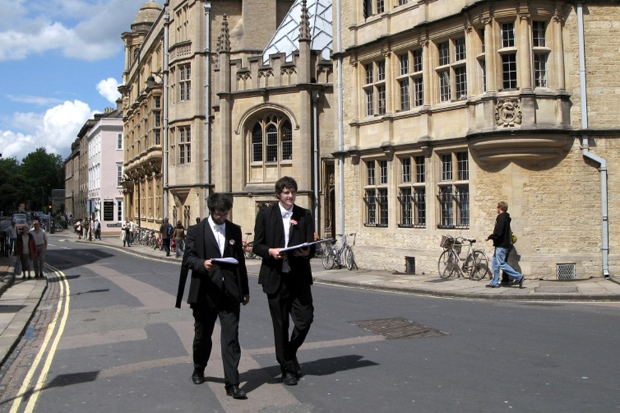‘What distinguishes Cambridge from Oxford,’ wrote A.A. Milne in 1939,
is that nobody who has been to Cambridge feels impelled to write about it… [whereas] every Oxonian has at least one book about Oxford inside him… Oxford men will say that this shows what a much more inspiring place Oxford is, and Cambridge men will say that it shows how much less quickly Oxford men grow up.
The hefty and brilliant tome that has escaped from inside Professor Brockliss is very grown up indeed and, as a history of the university, greater than all those that have come before. (The previous, eight-volume account that inspired this one has many fine qualities, but accessibility is not one of them.)
Brockliss is a rare hybrid of blues dark and light, having spent his formative years in the Fens before atoning for this sin by serving 32 years as a history don at Magdalen. He sets Oxford’s evolution squarely amid that of the European university at large — the developments of Paris, Bologna and the German schools — and places it within the necessary context of English political history. At the heart of his investigation is a near contradiction: that a university so fundamentally conservative and traditional has been able completely to re-invent itself several times over.
The medieval Catholic university, which morphed out of a collection of independent tutors renting rooms in the city, was effectively established in 1214 — like many great enterprises — by accident and after a fight. The Papal Bull settling a dispute between town and gown gave a distinct legal status to the students, their tutors and chancellor, which then came to underpin future collective action. Then, from the 13th century, benefactors seeking immortality established colleges guaranteeing provisions for scholars, formalising the rhythms of their lives and instituting another layer of independence from external interference. Such independence has served Oxford well. The university has had a longer continual existence than almost everything in England, bar England itself, its shires, its Church and the penny (the Crown having been rudely interrupted by Cromwell).
This studium for Catholic preachers and teachers gave way under the tumult of Reformation. Indeed, the university’s ability to turn on a sixpence and become, within a century, the Anglican seminary par excellence, readying and steadying the minds of the men who would power the English Church, says much for its adaptability (and survival instinct). These Catholic and Anglican Oxfords were not, however, centres of research — universities were there largely to impart accepted knowledge and intellectual skills rather than to discover new truths (indeed, new truths, such as John Wycliffe’s Lollardy, had tended to cause more trouble than they were worth). As Brockliss argues, it took the rationalism of modern Germans (notably Kant and Humboldt) to demand that institutions contribute to progress and the march of the mind.
Oxford was slow on the uptake. When the Whigs (since the Civil War often Cambridge men to Oxford’s Tories) criticised the conservatism of the Oxford BA, the establishment struck back. Edward Copleston, provost of Oriel, retorted that the study of, for example, Thucydides and Xenophon, trained the mind and created citizens who could turn their hand to any business in life. Such thinking had led the 18th-century English gentry to view an Oxford arts degree as an essential part of a gentleman’s rite of passage — and so, by degrees (as it were), Oxford’s primary function became the turning of ‘callow youths… into intelligent, upright, and dedicated servants of the British mission civilisatrice’.
From 1945, this imperial Oxford became a world university of a different sort, battling for global status against the Croesian riches of American institutions. Brockliss reveals how adroit Oxford has been in both playing (occasionally bizarre) government funding schemes and attracting private wealth, to become one of Planet Earth’s premier research outfits. What new phase, then, will next define old Oxford? In a world of perpetually declining state funding, Brockliss suggests that the university might do well to bolster its independence and go private, relying on its vast network of supporters to provide the £8 billion necessary to do so.
More existentially, what future does a city university have in an age of digital resources and communications? Conjuring up a virtual Oxford, no longer bound by the city, of distance learning, internet tutorials, YouTube lectures, chat-room seminars and the like, Brockliss imagines a rapidly increased university population and income. As a supplement, maybe. A few more generations yet will surely hanker to inhabit its bell-swarmèd streets.
Across all these ages and phases, the most timeless and stirring statement of Oxford’s purpose is perhaps that from the Book of Daniel inscribed inside the Old Bodleian: Plurimi pertransibunt et multiplex erit scientia (Many shall pass by and knowledge will be multiplied). Brockliss’s exceptional history reveals a remarkable amount about the multitudes and their multiplications, and adds an enduring contribution of its own.






Comments